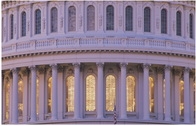Advertisement
ICBA Petitions Congress Regarding Too-Big-To-Fail Firms

The Independent Community Bankers of America (ICBA) told Congress in a written statement that subsidies for a small number of too-big-to-fail firms increase systemic risk and pose a direct threat to our economy and taxpayers. The association also noted that the neglected consequence of these too-big-to-fail subsidies is their contribution to community bank regulatory burden. The statement was submitted ahead of the Senate Banking Subcommittee on Financial Institutions and Consumer Protection hearing on the Government Accountability Office’s report on government support for bank holding companies.
“Today’s megabanks are a creation of government subsidies. When they misuse their size and market power, the rules enacted in response too often sweep in community banks,” ICBA said in the statement. “A timely example of this phenomenon is the agencies’ final Volcker Rule, issued December 10.”
A provision of the final Volcker Rule requires all banks to divest their holdings of trust-preferred securities backed by collateralized debt obligations. Accounting standards require these banks to recognize immediately an impairment of their investments, which could result in write-downs based on fire sale prices. ICBA urged the committee to promptly take up legislation to exempt community banks from this provision of the final Volcker Rule.
The ICBA statement also noted that SNL Financial recently found that the five largest U.S. banks now control 44.2 percent of the industry’s assets, a share that has steadily increased in recent years. In 1990, the five largest banks controlled only 9.7 percent of all bank assets.
ICBA said it looks forward to the Government Accountability Office’s upcoming release of a study on the value of the government’s subsidy for too-big-to-fail financial firms. The association also said it is open to constructive proposals to address the too-big-to-fail problem, such as the Terminating Bailouts for Taxpayer Fairness (TBTF) Act (S. 798). Introduced by Sens. Sherrod Brown (D-Ohio) and David Vitter (R-La.), S. 798 takes a clean approach to the problem by requiring the largest, riskiest banks to hold more leverage equity capital, which will allow them to operate more safely, absorb more losses and avoid a government or taxpayer bailout.
ICBA also called on Congress to consider how ICBA’s Plan for Prosperity (PFP) would help offset the growing regulatory burden of too-big-to-fail on community banks and their customers. While too-big-to-fail is the ultimate source of the problem, and ICBA urges the committee to pursue vigorous and practical solutions to too-big-to-fail, the regulatory relief provided by the Plan for Prosperity will help community banks promote entrepreneurship, economic growth, and job creation. ICBA encourages this committee to take up legislation that embodies PFP provisions. In particular, the CLEAR Relief Act (S. 1349), introduced by Sens. Jerry Moran, Jon Tester and Mark Kirk, contains four PFP provisions, including mortgage reform, an increase in the Sarbanes-Oxley 404(b) exemption, and other provisions.
About the author





